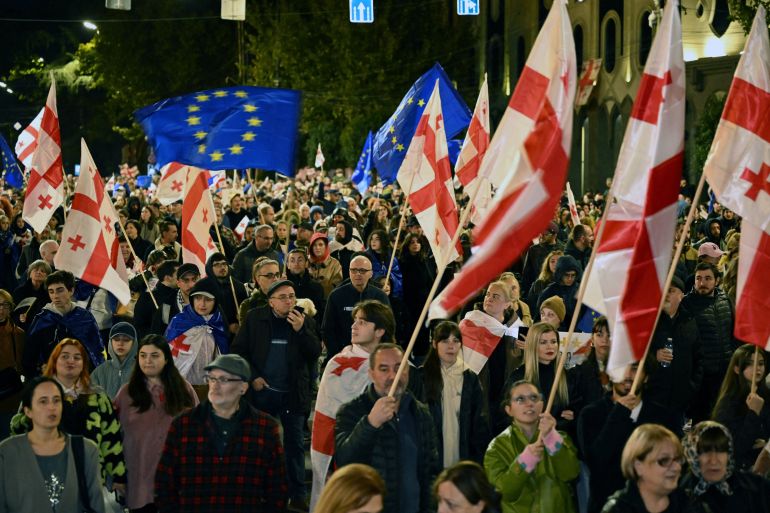Georgians rally in support of EU membership ahead of elections
The European Union froze accession talks after Georgia’s government passed a controversial ‘foreign influence law’ earlier this year.
Protesters wave flags during a pro-Europe rally ahead of the parliamentary elections, which are seen as a crucial test for Georia’s democracy and its bid for EU membership, in Tbilisi, Georgia on October 20, 2024 [Vano Shlamov/AFP]Published On 20 Oct 202420 Oct 2024
Tens of thousands of people in Georgia have attended a pro-Europe rally, days before parliamentary elections seen as a crucial test for the country’s democracy and its bid for European Union membership.
Saturday’s vote will pit an unprecedented alliance of pro-Western opposition forces against the ruling Georgian Dream party, accused by Brussels of shifting towards authoritarianism and derailing EU candidate Georgia from its European path.
Pro-Western President Salome Zurabichvili – at loggerheads with the government – attended Sunday’s rally, which she has said would “demonstrate people’s will for freedom, independence, and a European future”.
Tens of thousands of demonstrators, waving EU and Georgian flags and holding banners that read “Georgia chooses the European Union” gathered at Tbilisi’s central Freedom Square after marching towards the venue from five different locations.
Several Georgian NGOs, including Georgia’s European Orbit and the “My Voice to the EU” coalition, called on Georgians to stage a mass rally there.
“Choosing unity, development, and the European Union, Georgians will rally on October 20 (Sunday) and show their resolve to pursue the path of EU membership,” organisers had said on Facebook.
Brussels froze Georgia’s EU accession process after Georgian Dream lawmakers this spring passed a controversial “foreign influence law” targeting civil society.
‘Crucial test’
The adoption of the measure – criticised as a Kremlin-style law to silence dissent – sparked weeks of mass street protests and also prompted Washington to impose sanctions on dozens of Georgian officials.
Earlier this month, EU foreign policy chief Josep Borrell cautioned that Georgian Dream’s actions “signal a shift towards authoritarianism”.
He called the upcoming polls “a crucial test for democracy in Georgia and its European Union path”.
Opinion polls suggest opposition parties are likely to garner enough votes in Saturday’s election to form a coalition government and replace the ruling party, controlled by powerful billionaire Bidzina Ivanishvili.
Analysts have warned of the risk of turmoil if Georgian Dream attempts to hold onto power regardless of the vote’s outcome.
In power since 2012, the party initially pursued a liberal pro-Western policy agenda, but over the last two years has reversed course and been accused of moving closer to Moscow amid its invasion of Ukraine.
Bids for membership in the EU and NATO are enshrined in Georgia’s constitution and supported by some 80 percent of the population, according to multiple opinion polls commissioned by groups including the National Democratic Institute and the International Republican Institute.
